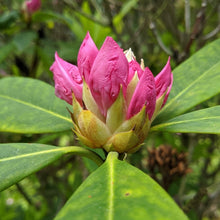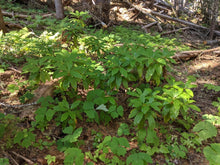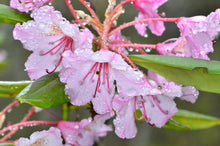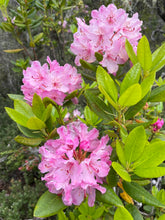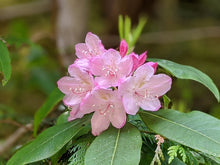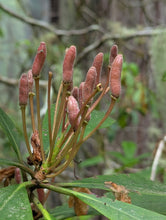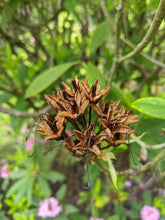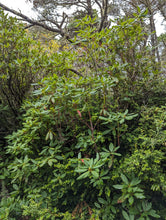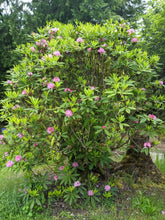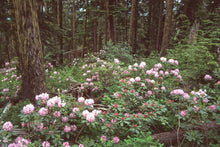
Rhododendron macrophyllum
Pacific rhododendron is a large, upright evergreen shrub that thrives in partial to full shade and acidic soil, making it ideal for woodland gardens and forest edges. In late spring to early summer, it bursts into bloom with spectacular clusters of large, vibrant pink to white flowers that stand out against its dark green, leathery foliage. This striking shrub not only adds dramatic beauty to the landscape but also supports native pollinators, such as bees and hummingbirds, and provides excellent cover for birds and small wildlife.
- Plant type/canopy layer: evergreen, perennial, large shrub
- Size at maturity: 3-25' tall, 5-10' wide
- Light requirements: part sun/part shade, full shade
- Moisture requirements: dry to moist soil
- Bloom time: April - August (depending on location and altitude)
- Growth rate/ease: medium growth rate, easy to grow in the right conditions
- Wildlife support: flowers attract and provide nectar to hummingbirds, adult butterflies, bees and other insect pollinators and are eaten by deer; the overall plant is known to be a nesting site for songbirds, provides shelter for small mammals and is believed to host 23 species of native butterflies and moths
- Native habitat/range: grows in moist to dry forested environments, particularly Douglas-fir and mixed evergreen forests, sea level to 1900m, from British Columbia to Northern California. In Oregon and Washington, it primarily occurs from the Cascades to the coast. Portland Plant List - no.
- Special features & uses: deer resistant foliage (flowers may be fair game); evergreen; according to the Washington Native Plant Society Karuk have used Pacific rhododendron in the luck-getting ceremony of the sweat house and Pomo have used the flowers in dance wreaths for the strawberry festival; landscape uses include pollinator gardens, woodland gardens, erosion control and habitat hedgerows; state flower of Washington
Gardening with Pacific Rhododendron: This is a plant that will tolerate a wide range of growing conditions, even the dreaded dry shade. That said, you'll get the most robust plant and dazzling flowers if you offer it partial sun with acidic soils that are loamy or clay and well-drained (it will not perform well in sandy soils). Try it as an anchor in your woodland garden, interspersed with native ferns and groundcovers, as part of a flowering habitat hedgerow or as a foundation plant that will frame your home after many years of growth.
Photo Credits 1, 7, 9 (buds, open seed pods, habit): © John A Haskins, some rights reserved (CC-BY)
Photo Credits 2, 5, 6, 8 (with companions, flowers, fruits, habit) © David Anderson, some rights reserved (CC-BY)
Photo Credit 3 (wet flowers): © Don Loarie, some rights reserved (CC-BY)
Photo Credit 4 (three flower clusters): © Cricket Raspet, some rights reserved (CC-BY)
Photo Credit 10 (blooming forest population): © Ed Alverson, some rights reserved (CC-BY)










